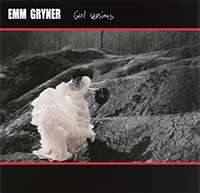Girl Versions
Girl Versions is the sixth full-length album by Canadian singer-songwriter Emm Gryner, released in 2001 on Gryner's independent Dead Daisy Records. It received a Juno Awards nomination for "Best Pop Album" in 2002.[1]
| Girl Versions | ||||
|---|---|---|---|---|
 | ||||
| Studio album by | ||||
| Released | 2001 | |||
| Genre | Rock/Pop | |||
| Label | Dead Daisy | |||
| Producer | Chris Wardman | |||
| Emm Gryner chronology | ||||
| ||||
Similarly to Tori Amos' Strange Little Girls, which was released the same year, Girl Versions presented Gryner's reinterpretations of songs written by men. Unlike Amos' album, however, Gryner did not create characters to present the songs in an ironic or political context; instead, she simply chose some of her own favourite rock, heavy metal and punk songs and interpreted them in her own more pop-oriented style.
The album was first recorded live in Sarnia's Imperial Theatre. Originally it was her and her piano. The recordings were allegedly lost and re-recorded at Umbrella Studios in Toronto by producer Chris Wardman and a cello was added to some songs. The attendees from that original show are credited in the liner notes.
A song that was played at the show that was cut from the album was "I'll Stick Around" by The Foo Fighters. The concert included a cameo by Canadian astronaut and Sarnia local Chris Hadfield. He played guitar and sang a song about Canadian Tire.
Track listing
- "Waiting Room" (Fugazi)
- "Crazy Train" (Ozzy Osbourne)
- "Pour Some Sugar On Me" (Def Leppard)
- "For What Reason" (Death Cab for Cutie)
- "Straight to Hell" (The Clash)
- "Song 2" (Blur)
- "Straight to You" (Nick Cave)
- "Big Bang Baby" (Stone Temple Pilots)
- "Sea Song" (Robert Wyatt)
- "The Day We Hit the Coast" (Thrush Hermit)